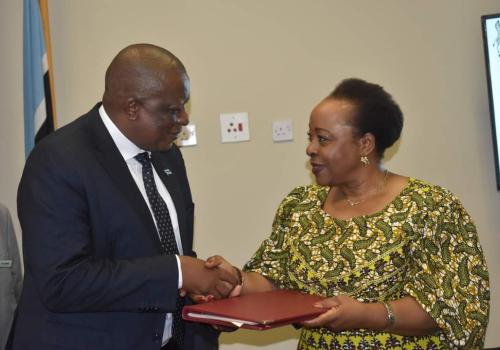The Republic of Botswana has signed the Charter establishing the Southern African Development Community (SADC) Fisheries Monitoring Control and Surveillance Coordination Centre (MCSCC) on 9th March 2023. The signing took place at a ceremony in Gaborone, Botswana, with guest of honour, Honourable Molebatsi Shimane Molebatsi, Assistant Minister of Agriculture in Botswana, signing the Charter in the presence of the SADC Deputy Executive Secretary for Regional Integration, Ms Angele Makomo N’tumba.
Botswana has become the 11th signatory of the Charter, meaning the Region has reached the required two-thirds threshold for the Charter to enter into force in order for the MCSCC to be established to assist the Region in prioritising the protection of fisheries to underpin greater benefits and blue economy growth. Angola, Eswatini, Lesotho, Madagascar, Malawi, Mozambique, Namibia, South Africa, the United Republic of Tanzania, and Zambia have already signed the Charter..
The MCSCC will coordinate regional fisheries data and information sharing services, a regional fishing vessel register, provide fisheries surveillance services, coordinate fisheries observers and support the implementation of port state measures, provide fisheries enforcement and legal support services, and support improvements in the capacity of national Monitoring Control and Surveillance (MCS) systems.
The Charter will officially enter into force in 30 days. The MCSCC will be based in Katembe municipal district of Maputo, and the Government of Mozambique is ready to implement this with support from other SADC Member States, and funding from the World Bank. Land has already been secured and prepared for the construction of the Centre in Katembe. In his keynote address, Hon. Molebatsi, said: “By uniting through the Regional Fisheries Monitoring, Control and Surveillance Coordination Centre (MCSCC), coordinated schemes for inspection of fishing vessels and gears, coordinated border controls to monitor fish trade, shared intelligence and information and the cooperative use of remote and physical inspection tools, robust protection for a region, their resources and their markets are developed. When resources are pooled together, they are strengthened, made more efficient and support wider and more comprehensive detection of illegal operators creating a real barrier and deterrence to illegal, unreported and unregulated fishing.”
Ms. Angele Makomo N’tumba, Deputy Executive Secretary-Regional Integration at SADC Secretariat, said: “The realisation of this Centre marks a turning point, from which we now have the means to facilitate our full collaboration to protect our fisheries for our common future. We have now moved closer to realising the aspirations of the Region as contained in the 2008 Statement of Commitment to Combat IUU Fishing by SADC Ministers of Fisheries.”
Mr. Solani Mhango, World Wide Fund for Nature (WWF) Country Director said IUU is one of the main causes of overfishing and a barrier to achieve sustainable management of fish stocks in the SADC Region. Overfishing causes economic losses to SADC countries, as overfished stocks produce and contribute less to the socio-economy of the Region. Therefore, the operational SADC MCSCC addressing effectively IUU Fishing in commercial fisheries is one of the priorities in the WWF strategy for the South west Indian Ocean (SWIO) Seascape and SADC Region, and WWF commits to continue its support to this initiative and others in the Region.
Mr. Mark Ssemakula, Chairperson of Stop Illegal Fishing, stated the first activity of his organisation was to support the SADC Secretariat and Member States to develop the Statement of Commitment on IUU fishing in 2008. Since then, illegal operators have been fined, vessels have been confiscated, and corrupt networks have been disrupted. Through this, a much greater understanding about IUU fishing operators has developed and with this knowledge countries are better armed to overcome it. Messages of support and commitments to continue cooperation with SADC in realising this Centre were received during the ceremony from the UN Food and Agriculture Organisation (FAO), United States (US) Embassy to Botswana, United Kingdom (UK) High Commission to Botswana, World Wide Fund for Nature (WWF) and Stop Illegal Fishing (SIF).

